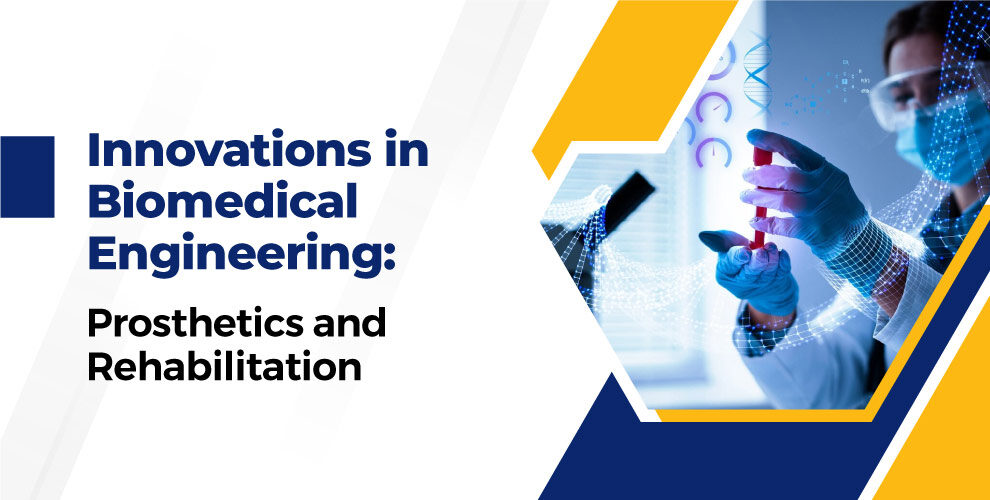The principles of biomedical engineering are applicable to the design of new healthcare products, which are essential for the development of devices. The devices are in the form of medical or drug delivery devices as they grow complex, which requires biomedical and mechanical engineering to develop better gadgets. Engineers need to apply standards and critical thinking skills to resolve issues in medicine. Human health and healthcare advancements are the primary focus of this field. There are various areas of specialization inside BME, covering a wide range of areas of medication. The best biomedical engineering colleges in Coimbatore focus on developing healthcare and expect engineers to create advancements and innovations in different areas of specialization in BME and different areas of medicine. However, this blog is about the advancements in biomedical engineering in the healthcare industry, which engineers today need to know.
Innovations in Biomedical Engineering:
In recent times, augmented and virtual reality have the potential to create prosthesis design, training, and application. Secondly, tissue engineering and bioprinting are now becoming prevalent, which allow living tissues to generate energy using organically dynamic cells. The trend toward artificial tissues is possible with bioprinting, which helps in creating healthy skin for grafting that can be transplanted to living donors. These are some of the useful advancements. This field also contributes to biomedical innovations and surgical advances, which are:
- Muscle reinnervation
- Regenerative peripheral nerve interfaces
- Agonist-antagonist myoneural interfaces
- Targeted sensory reinnervation
- Development of Osseo integrated, or bone-anchored
- Surgical robotics
- Wearable medical gadgets
- Organs-on-chips
- Microbubbles
Let’s discuss a few of the innovations in biomedical engineering which are now getting better feedback from the people.
Prosthetics advancements:
- Prosthetic limb innovations have created a greater impact and are familiar innovations in biomedical engineering. It is better than conventional prosthetics, which are often restricted in their functions and make it challenging for the users.
- This challenge is resolved with modern prosthetic limbs as they incorporate advanced technologies like robotics and artificial intelligence, making functionality and control easier.
- The use of lightweight materials and better design techniques than the traditional ones let people use them more comfortably and are also available in customized fits.
- Engineers developed this prosthetic trend, which mimics the natural movement of human limbs and allows people to walk, run, and perform various activities.
- Advanced prosthetics offer sensory responses that enable people to experience pressure, temperature, and touch.
Advancements in Rehabilitation:
- The biomedical engineering field has revolutionized the field of rehabilitation, which actually expands the opportunities for people who are recovering from injuries or living with chronic conditions. Biomedical engineers have a greater role in designing innovative solutions for the rehabilitation process and developing the expected results.
- The use of technology like virtual reality is applied to restore people with physical disabilities. It allows the patients or users to enhance their motor skills with interactive exercises and balance with the virtual environment.
- Modern technology helps people regain strength and flexibility with new advancements. You can find evidence in the innovations of mechanical exoskeletons and robotic limbs, which provide support to patients in therapy sessions and enhance their health.
- People with disabilities can explore these technologies. However, biomedical engineering innovations have a great role in enhancing sports performance. From planning progressed prosthetics for para-competitors to creating wearable sensors that examine biomechanics, this indicated the role of engineers has a great part in the sports sector.
- Emerging technologies offer great support to surgeons, rehabilitation physicians, therapists, and prosthetists to make profoundly operational prostheses with raised sense and motor control.
What is the future of biomedical engineering?
It is evident that biomedical engineering is a rapidly developing and evolving field. The way medicine is practiced is being transformed by revolutionary advancements in medical imaging and diagnostics, and this transformation will continue. However, the development is still in its beginning phases. Engineers now continue to create and design advancements in the medical field and enhance healthcare standards with new innovative techniques and approaches like tissue engineering and stem cell therapy.
Second, the expectations of regenerative medicine started to rise, indicating that the engineers’ contribution to this innovation is huge. However, with the growth of technological advancements, engineers can have a great opportunity in terms of creating influence in many people’s lives and also in their personal career growth.
To summarize, the above insights will give you a clear idea of the innovations in biomedical engineering. The growth of robotic surgery into medical virtual reality symbolizes that biomedical engineering is an evolution. And the importance of engineers in developing new tech or medical devices focusing on improving people’s lives and treatments grows. Therefore, the best biomedical engineering colleges in Tamil Nadu hold responsibility for creating an engineer who contributes to the design of future innovations that are upgraded as technology continues to grow.


